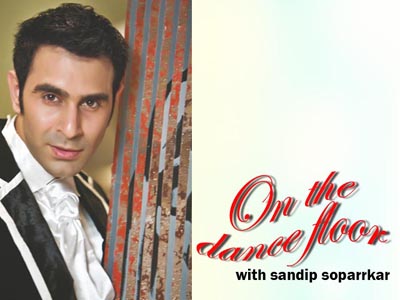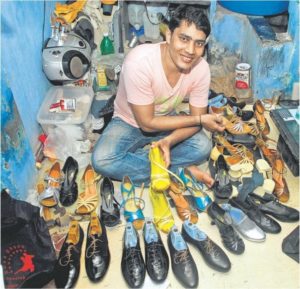It’s all about ‘shoe’ business

When you see an elegant dancer on the dance floor spinning and twirling around swiftly, have you ever wondered from where does that smoothness come from? Graceful dancers, swinging to the beat of cha cha cha and salsa, keep you glued to their silky movements. Dancing to the rhythm with elegance of movement is more than just talent. This could have something to do with the shoes you’re wearing. If you ever cared to look beneath a dancer, you will realise that most of the grace and energy comes from the correct footwear.
There are a lot of shoes to choose from in the market. That is why it is wise to compare each of them and closely examine their bottoms, toe boxes etc. You must not forget the kind of floor you often dance on to make it a point that the shoe design makes foot movement easier. This way you’d know better whether your shoes fit with what you’re stepping on and with what you’re doing.
Indian classical dance demands no footwear – the ghungroo is the only footwear. On the other hand, international dancers need shoes and this footwear is like ghungroo for international dance lovers. We too pray and respect our dance shoes just like ghungroo. Today, I will give you a low down on the fashion aspect of the dance footwear.
Our flooring is often made of wood or cement. Thus, it is good to wear dancing shoes that support just enough friction between the floor and the soles. However, regular rubber or leather sole shoe may cling or slip extra on the dance floors. Thus, it is better to purchase or custom-made dancing shoes with soles made of only suede.
Generally, soft flexible suede sole dance shoes’ body as well as the heel is made of pure leather and the ankle support is longer than normal shoes. This helps maintain balance between the slip and the grip techniques that lets the dance move swiftly on smooth dance floor. It is difficult to find good suede shoes in India but according to Jameel Shah, director, Shah Shoes, the only Indian dance shoe company that has copied the art of making typical dance shoes from abroad and sells replicas in various colours and styles, says, “You can fold the dance shoe anyway you want to. It takes the shape of your foot unlike normal shoes. This is the essence of dancing shoes. They are comfortable and do not restrict the movement of your feet. Whether you are on your heels or toes, it supports you throughout — the cushioning supports the knees and the ankle avoids injuries.”
Shah Shoes has his main outlet in Mumbai but supplies to most dance schools in India. They work through email: shahshoes@yahoo.in and each shoe ranges between Rs 2,000 and Rs 5,000. The other option is to buy them online from www.supadance.com, www.showtimedanceshoes.com and www.danceshoesonline.com but the international order can range from $50-120 per pair plus courier charges.
Every dance form needs different kind of shoes; I recommend standard heel shoes – small and thin for ballroom dances like the waltz, quickstep, tango and foxtrot. Cha Cha Cha, jive, samba and salsa are best complimented with feet gear that have broader and bigger heels as broad big heels enhances the hip movement of Latin dancers and helps them make swift twirls and graceful footwork. Then we have jazz shoes and contemporary dancers, ballet shoes or character shoes for other Western dances.
The choice of colours are an important aspect while buying dance shoes. For example, the tango is a dramatic dance form, hence a combination of black and white shoes add onto the effect. The standard black shoe for men is most common in leather or patent leather and dainty silver, golden and skin shoes for women are common colours for Latin American dances. Women, nowadays, are experimenting with reds, shimmers, pinks and even yellows and greens but such experiment is mostly done by performers and not students. The right shoe and the right colour take the performance to a different level. One has to experience it to believe it. So invest in an appropriate dancewear and put your best foot forward.
Dance Shoe Care
Brush your shoe regularly, from top and sole.
Use a wire bristles shoe brush for soles.
Polish shoes before and after use.
Do not wear your dance shoes to a party or outdoors. They are to be used on the dance floor.
Keep your shoe in a cloth bag through which they can breathe. It is important to allow dance shoes to breathe if you want them to last longer.
Air your shoes once or twice a week and more during rainy season as it can catch fungus.
Lastly, pack and unpack your shoes carefully after every use.



